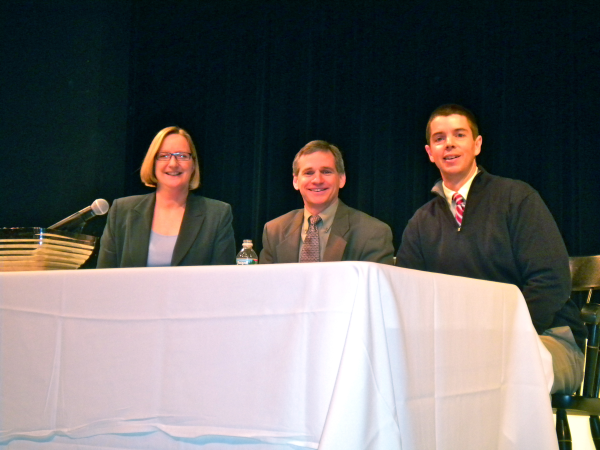As students were preparing for mid-winter break, Beth Wiser, of the University of Vermont, and Matt Malatesta, of Union College, drew a crowd to the Williston Theater.
The two directors of college admission offices were on campus on Feb. 2 to share tips on how parents and students could make the college search process enjoyable and manageable.
Williston’s Director of College Counseling Tim Cheney began by advising the assembled juniors and their parents to remember that the admission process is about tough choices.
“This is a process in which you will need to make decisions,” he told the parents and students. “We may look at the list of schools that you bring us and ask you to take some of those great schools off it.”While the Common App allows a student to apply to up to 20 schools, Williston students apply to an average of eight, he said.
Union College Director of Admission Matt Malatesta also urged students to keep their list short and focused.
“Don’t fixate on selectivity. Focus on fit and you will have good options at the end,” he said. “Spend time on the campus and in the area, and really get to know the school.”
UVM’s Wiser agreed.
“The best way to ensure that you have good options at the end of the process is to include reach, just right, and safety schools—and a financial safety—on your list,” she said.
Surprisingly, many families do not contact financial aid offices when they are researching colleges, she said, adding that there is a great deal to be learned by doing so, as each school has different policies on how they include financial need in their admission decisions.
Among the questions families should ask: Is need a factor in admission decisions? How much need-based aid is offered? Are merit scholarships offered?
Due to recent federal regulations, every college website now includes a “Net Price Calculator” to help families determine how the school will view their financial need.
Ensuring that colleges get to know prospective students is a key component of the college admission process. The essay is one opportunity to do this, said Wiser, as are supplemental questions on the school’s application.
According to Malatesta, students often neglect questions such as “What interests you about __ college” which provide a good opportunity to highlight their interests and talents.
The college admission process is one of self-discovery for students as they select colleges that match their passions, Malesta said. Students need to convey those interests to colleges in the application and interview process.
Malatesta also advised students to “check with colleges about what degree of contact they consider necessary.” If the application is the first contact with the school, that might not be viewed positively, he said.
“Make sure your essay is your own voice,” Malatesta said. He added that students should resist the temptation to have “47 people review your essay” and change it in ways that do not reflect who they are.
“Take advantage of any opportunity to bring your special talents forward” Malatesta said. The admission office will not be evaluating athletic or artistic talent—coaches and faculty will, so be certain to be in contact with them.
Wiser offered these parting tips to parents and students:
1. Be organized. Deadlines matter in the college admission process. This is an area where parents can provide support.
2. Be authentic. Who you are should shine through in your application materials.
3. College admission is not a game to be won—it is about presenting yourself in the best light.
4. Relax and enjoy the process!


